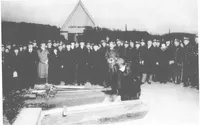Seminar I: The Political Cult of the Dead
-
Is there a link between private mourning and the ‘political cult of the dead’?
-
Is it always possible to give death in war a national meaning?
-
Did memorial culture in interwar Poland integrate or divide the nation?
-
Which role did the First World War play in the Soviet Union?
- What are the main characteristics of the Bolshevik ‘Political Cult of the Dead’?
Essential Reading
Mosse, George L., Fallen Soldiers. Reshaping the Memory of the World War (New York/Oxford, 1990), pp. 70-106 [= Chapter 5: ‘The Cult of the Fallen Soldier’]
Stockdale, Melissa K., ‘United in Gratitude: Honoring Soldiers and Defining the Nation in Russia’s Great War’, Kritika, 7 (2006), pp. 459-485.
Cohen, Aaron J., ‘Oh, That? Myth, Memory, and World War I in the Russian Emigration and the Soviet Union’, Slavic Review, 62 (2003), pp. 69-86.
Laqueur, Thomas W., ‘Memory and Naming in the Great War’, in Gillis, Commemorations, pp. 150-185.
Mick, Christoph, ‘Experiences of War and Conflicting Memories – Poles, Ukrainians and Jews in Lvov 1914-1939’, in: Dubnow Yearbook, 4 (2005), 257-278.
Additional Reading
Gregory, Adrian, The Silence of Memory. Armistice Day 1919-1946 (Oxford/Providence, 1994), pp. 8-50 (= Chapter 1: ‘Lest we forget: The Invention and Reception of Armistice Day’)
Merridale, Catherine, ‘War, Death, and Remembrance in Soviet Russia’, in Winter and Sivan, War and Remembrance, pp. 61-83.

